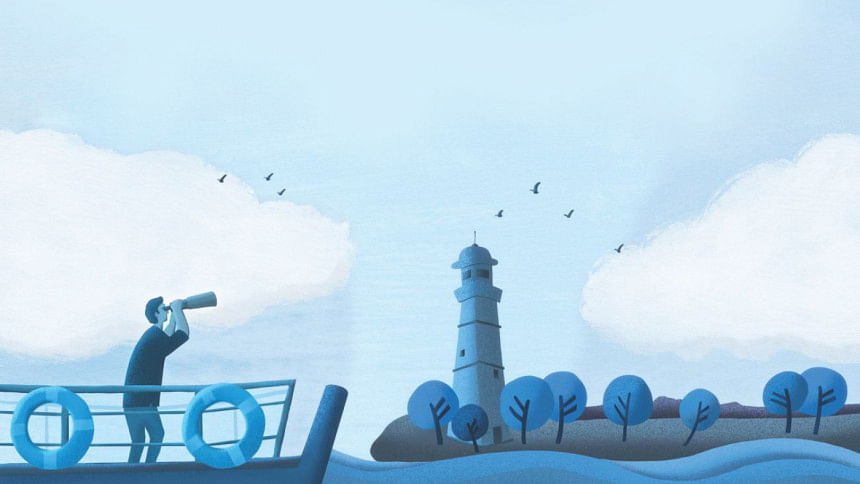Water Rising: Climate Change and Us

The Lighthouse
by Aaqib Hasib
I remembered my parents' 10th marriage anniversary. We all went on a trip to Cox's Bazaar to celebrate; I was only five-years-old back then and it was my first time visiting the wondrous beach city. The beautiful beach was a sight to behold, and I remember wanting nothing more than to spend every minute of that holiday running through the sand while the waves slowly came and drenched my feet, over and over.
Skip ahead ten years to the present, and this memory was all that was left of Cox's Bazaar.
Five years after my initial visit, Cox's Bazaar had been buried at sea. When it began, it had seemed like a harmless rise in the water levels. Ever so slowly, more and more of the beach would be taken under, but no one cared. People still kept visiting the town, even till its final days.
The beginning of the end started with the cyclones. One after another, they tormented the city for months.
Many lives were lost during that time, and while the official numbers were never released, it was estimated that hundreds of thousands had drowned from Mother Nature's wrath. Or maybe they drowned due to our years of negligence.
No one had anticipated such a catastrophe. The general public had always been oblivious to the consequences of their own actions, so they would've never predicted such a large scale disaster. However, even the scientists, who spent their lives researching climate change, were appalled by the situation.
Maybe we were all optimistic, like we always had been.
Irrespective of what the reason was, the cause was on us; and so the merciless waves came and took away what was once ours.
The following years wouldn't yield any better results either. Natural disasters coupled with rising water levels decimated all low lying land in the South, leaving very few villages in its wake.
We continued being optimists; only this time, instead of investing in factories that would eventually kill the environment, we put our time and money into building seawalls in hopes of preserving the few cities that were left.
Alas, they too would fall.
Three years after the fall of Cox's Bazaar, the waves crept up to Chittagong. With the seawalls eventually failing, Chittagong found itself unguarded. The people were delirious at the prospect of a repeat of what happened to Cox's Bazaar, but the authorities would not initiate an evacuation of the city.
My father was able to get me and my mother out of the city. He, however, had to remain behind to serve his duties, the nature of which was unknown to me.
The night my mother and I set out to escape Chittagong was the last time I saw my father. A week later Bangladesh's second largest city would also begin to drown.
Coming back to the present, I found myself in Shibchar, near the banks of the Padma river. The journey to Shibchar had been long and perilous. The environment outside had gotten more dangerous in the last two years. The sun was harsher than ever before, scorching any exposed skin within minutes of stepping in its path. The dreaded sun was accompanied by the smog of toxic fumes, ever present and intensifying with time.
We travelled in groups, almost nomadic. Initially we had been a party of twelve. However, within months the number dwindled down to eight. My mother was amongst the four who didn't survive. She had been the only physical evidence of my life before the floods. With her gone, I found myself more lost than ever.
I continued on, however, determined as I was to preserve my memories for as long as possible before this unforgiving world consumed any evidence of my existence.
The greatest challenge was finding supplies. Everyone had begun journeying North since the fall of Chittagong, taking with them as much of a cities' food, clean water, and other essential supplies as they could.
We scavenged what we could. Our only hope was to cross the Padma river, and reach the Mawa Ghat docks, were sustenance awaited us. In order for us to board a boat, we needed to offer our supplies in exchange for safe passage.
Fortunately, we had enough supplies to afford a trip, for the five of us that now remained. We had spent days rationing our supplies, eating and drinking as little as possible, to the point of starvation.
That night, we boarded our vessel of hope, the Astha. The crew took almost all our supplies, smiling like hyenas as we turned over our last bottle of clean water to them. It would be worth it, I thought. I could see the lighthouse of Mawa Ghat in the distance; the beam of light which emanated from the top of it filled me with hope.
Salvation awaited us on the other side.

The Watchtower
by Rabita Saleh
They arrived in boats first, the displaced. The TVs used to blare out their numbers and names, for people to locate their families. As the number of boats dwindled, the optimistic swimmers began turning up. With their arrival the list of names meant little more than further funerals to arrange. Most people stopped coming to the docks after that.
I have been stationed at the Mawa Ghat dock for over 10 years now. When Cox's Bazaar went under, the higher-ups figured it wouldn't be long before a massive migration came about. That worried them enough for all these new infrastructure plans to go into swift motion. These docks, stations, even the sea walls, allegedly, weren't for the benefit of the displaced at all. I mean, there's no confirmation, but sailors with uncertain life spans seldom have a reason to lie. The sea walls were just meant to give the displaced some hope, and keep them in their homes for as long as possible, till it was too late. The authorities feared what mass migration would mean for the northern territory with its already sparse resources.
The docks were built to provide immediate help to migrants who turned up on our shores. However, we have strict orders to report the numbers as well, and I'm certain that we're being used to look out for any large scale migration.
It's 7 am by the time I've performed my customary surveillance routine. I put the binoculars down, and turn my back upon the expanse of water behind me. I jot down "No unusual developments" on the greyish recycled paper of the record books, and decide to go downstairs to see what the others are up to.
When I first joined, being stationed at the docks was a badge of honour. Now, the docks are understaffed and under-equipped to the point where food is scarce for the officers themselves, let alone the migrants. Previously, we used to get supplies shipped in every week; that dwindled to every two weeks after Chittagong went down, and now we're lucky to see suppliers come in more than once a month.
One time, word got out that a supply boat was on its way and some locals ambushed it before it could get to us. The following month was one of the most difficult times I'd passed as an officer. Yet, I hadn't wanted to report the incident. Eating whatever we could find, and conserving every last drop of clean water was only a month's predicament for us. For them, it was their everyday life. However, not all of the officers were as considerate as I was, especially not on the nights when we had managed no dinner at all. The day after the report was transmitted we got a fresh boat of supplies. The locals who had ambushed the first boat were taken into custody, with only rumours of their dreadful fates reaching our ears. The authorities had a zero tolerance policy for rebels.
Two other men reside in this watchtower with me. Upon going downstairs I see them playing ludo on the kitchen table. They look up as I enter the room. After a cursory glance and a nod from me, they go back to their game. We seldom exchange words. Nothing gets a man thirstier than meaningless small-talk. I look towards the stock cabinets, and realise that we're nearing the end of the month. No snacks for me. I decide a short walk along the coast might help distract me.
Before leaving the building I go into the exit closet. I put on my face-mask, shielding my lungs from the polluted air outside, and coat myself with copious amounts of ultra-strength sunscreen. Putting my rubber boots on, I step outside into the damp path leading away from the lighthouse. A deep breath through the mask does nothing to reinvigorate me. I miss the cool smog-free breeze we had back in the day. If I close my eyes, I can almost feel it blowing against my face. A feminine face swims past my closed eyelids. The last time I saw my wife had been half a decade ago, when she passed away of cholera. I was allowed a week off to bury her and settle my affairs. My son was thirteen at the time, too old to let him live here with me, they said. So he stayed in the city with a few distant relatives, and the last I had heard of him had been in a letter a couple years ago saying he was travelling further northwards in search of a job.
No tears welled in my eyes at the thought of my past family.
Water was more precious than the allure of grief.
While walking along the coast, something in my peripheral vision catches my eye. I don't know how I missed this during my routine, but there's clearly a boat making its way towards us. I scurry back towards the station, and go up the stairs to the top of the watchtower. Looking through my binoculars, I quickly count eight people aboard the optimistically named Astha.
I sigh once in despair, thinking of the three packets of biscuits and the last jug of water left in the pantry, before carrying out our authorised routine. Turning off the signalling light from the watchtower, I go downstairs to place the heavy padlocks on our main entrance, sealing it conclusively.
Eight, after all, is too many.
Aaqib loves petting doggos. Send him pictures of your ''good boys'' at [email protected]
and
Rabita Saleh is a perfectionist/workaholic. Email feedback to this generally boring person at [email protected]






Comments